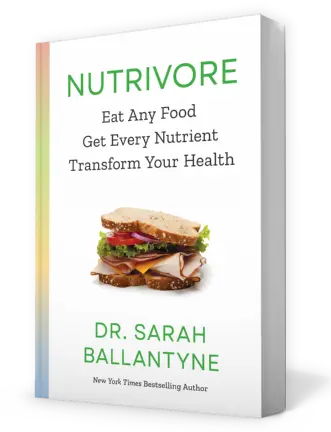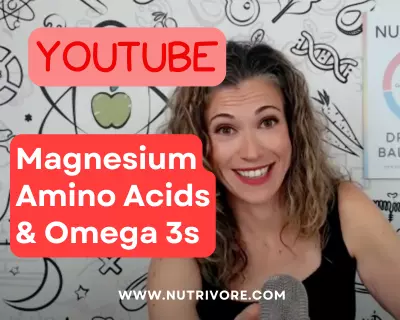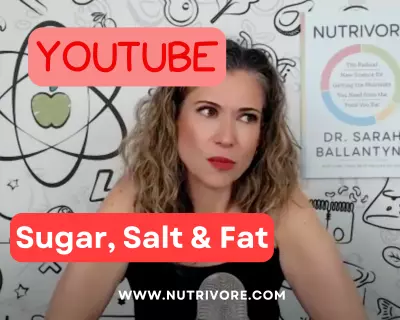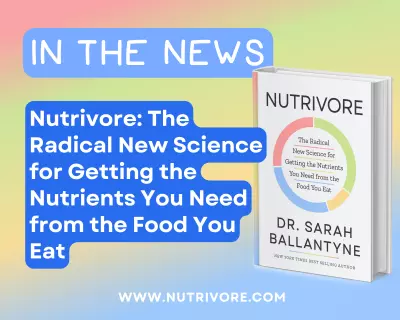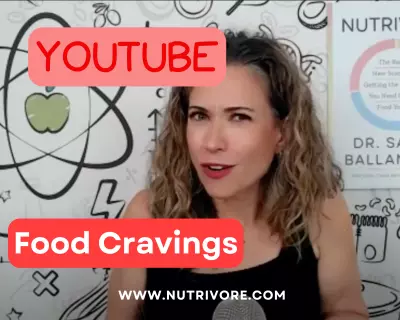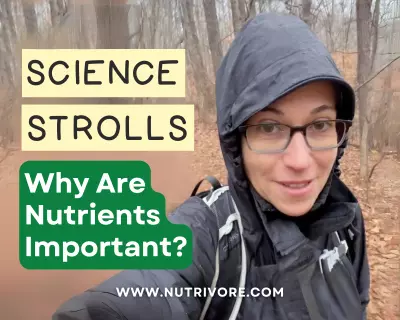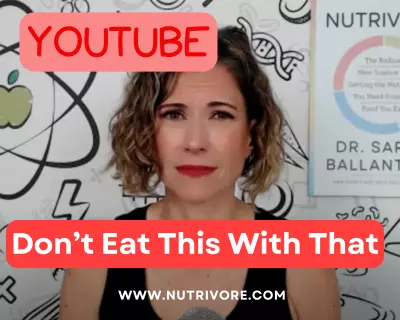Fat vs Water Soluble Nutrients
Producer Potts 0:20
Am I even eating the right combinations of foods to absorb these nutrients? Can you please explain the difference between water and fat soluble nutrients, and how much do we need to focus on the right food combinations when it comes to eating a nutrient dense diet?
Dr. Sarah 0:38
So the water versus fat soluble is just a chemical property of nutrients and not just vitamins, right? We divide vitamins into the water soluble vitamins, which is vitamin C and all of the B vitamins versus the fat soluble vitamins, which are vitamins A, D, E and K. We actually divide vitamins based on their solubility, but there are other nutrients that are fat soluble or water soluble. So for example, in phytonutrients, a lot of Polyphenols are water soluble. A lot of Carotenoids are fat soluble. So even in other sorts of nutrient classes, we have water soluble or fat soluble nutrients with minerals. It can depend on the form of the mineral in the food, whether or not it’s water soluble, fat, solvable. It’s fascinating. So all that’s referring to is the chemical property of does this compound dissolve in water? Yes, but then it’s water soluble, if it needs to dissolve in a solvent, then typically that means it’s fat soluble. So you could also dissolve it into alcohol, for example. So fat soluble over here does not dissolve in water. It just stays as a granule. Water Soluble over here you put that into water and it will dissolve.
Producer Potts 1:59
So what you’re saying is I need to take a tequila shot with my fat soluble vitamins.
Dr. Sarah 2:08
Yes, that was the most important take home message I had, definitely.
Producer Potts 2:15
Sorry You said dissolves in alcohol.
Dr. Sarah 2:17
I did say dissolved in alcohol. I did. I did. Well, Pandora’s box opened, and there’s no going back now.
Producer Potts 2:31
Okay, sorry, I’ll let you get back to it.
Dr. Sarah 2:33
Okay, so if you think about it, if you sprinkle some sugar or salt into water and, like you stir it and those, the crystals will eventually dissolve. Provided you, now we’re getting into complex chemistry, provided you didn’t, like, over saturate the solution, like, put in more sugar than can actually fit in between all the water molecules, right? Which is the temperature dependent. We’re not gonna, let’s, let’s just think about whether you can put it into water and stir and it disappears, versus, like oil and water don’t mix, right? So if you put droplets of oil into your water, you’ll float to the top, right? So like two good examples of sugar dissolving into water, oil not dissolving into water. So we have a combination of nutrients that are water soluble and another combination that are fat soluble. So for all of the water soluble nutrients, they all absorb pretty easily, because it turns out we have a lot of water in our bodies, pretty easy for them to get across the gut barrier. Fat soluble nutrients tend to be absorbed better with fat, they have a different digestion process. So they’re actually they’re packaged up with fat, and so then they are broken down by first bile that breaks them up into little drops, and then by fat, digesting enzymes called lipases into little, tiny drops, and they form these very, very small, little spheres of fat soluble nutrients called micelles. And then micelles are absorbed across the gut barrier into either a bloodstream or lymphatic system. So they’re absorbed differently, so compared to something that would diffuse or be transported by a like receptor, like a transporter molecule, fat soluble nutrients tend to be transported via micelles. So what that means is, if you just consumed, this is really relevant, if we’re consuming fat soluble nutrients and vegetables. So green leafy vegetables are our best food source of vitamin K, which is the fat soluble vitamin and orange and green vegetables are our best sources of carotenoids, which is a really important class of antioxidant phytonutrients, some of which our body can turn into vitamins. And so those are fat soluble nutrients in vegetables that don’t have a lot of fat in them. So if we just consume the carrot or the spinach, we don’t actually absorb as much of the carotenoids or the vitamin K compared to if we add salad dressing to our spinach salad or roast those carrots and some olive oil. So when we’re consuming them with fat, basically there’s more fat around to package up into those micelles, with those fat cell nutrients to be absorbed into the body. So we see pretty dramatically increased absorption efficiency when those foods with fat. So it can make a huge difference, like a like 5% versus 90% difference.
Producer Potts 5:40
So you’re saying that adding fat and flavor to our food is actually really important, beneficial?
Dr. Sarah 5:48
Yes, so with fat soluble nutrients, when we consume those foods that have those nutrients with some fat, sometimes they’re in a food, right? Like Vitamin E is in the best food sources of vitamin E are nuts and seeds, avocados and olives, those all have fats in them already. So we don’t really need to add anything extra to them to be able to absorb that vitamin E very well, but vitamin K and carotenoids tend to be in foods that have not very much fat in them. So then we want to add some kind of fat. It doesn’t need to be like a salad dressing on spinach. It can be that I ate that spinach as part of a meal with a piece of salmon, right? Like it does. It just has to be in the meal. It doesn’t have the tequila shot. You know, actually, I don’t know, um, how, because, yes, this is okay. We’re just gonna get hypothetically nerdy here for a second, any chemists watching to weigh in? So just because it would dissolve in the tequila shot, if, if we were just like, mix it in a test tube, that doesn’t mean that it facilitates digest absorption through my cells, we’re not going to be facilitating my cell production with tequila the way we are by consuming fat. So I don’t think, even though it would dissolve fairly well in a lab environment, I don’t think it actually translates to increased absorption in our gastrointestinal tracts. So there we go. I’ve busted my own tequila. I started.
Producer Potts 7:21
I love it. Pandora’s Box, everything closed in and shut
Dr. Sarah 7:27
So, yes, so we don’t really need like, we don’t need to like I I’m more. I enjoy salad dressing more than I used to. I used to hate it. Now I am very picky about it. I like it with some salads and not with others. So it’s just, I’m just weird that way. What can I say? Plain lettuce is my favorite vegetable. It’s fine. The number of people who just hit unsubscribe because I said that or went straight to the comments to say, what plain lettuce is your favorite vegetable? What kind of person are you? But I don’t need to worry about whether or not I’m going to absorb those nutrients, because I’m always going to have that salad, even if I don’t have salad dressing as part of a meal that has other things that will have that fat content. So like, the bigger part of the question of do I need to worry about this is no, like, as long as, I mean, even, even in the situation where you were, like, just having carrot sticks for a snack, yeah, you won’t absorb as much of the carotenoids compared to if you dipped those carrot sticks in some ranch dressing with your snack, right? But in the grand scheme of a diet that has lots of vegetables in it, and you’re eating vegetables with your meals as well, like, then you don’t really need to worry about it. You’re maybe not going to absorb it as well from that snack, but you’ll when you have, you know, something else that has carotenoids, you have spinach with your dinner tonight, then you’re going to still get, like, the same nutrients. So you don’t need to worry about it. So as long as we’re eating a diversity of foods and an overall relatively balanced macronutrient intake, we’re going to be absorbing those nutrients just fine.
Producer Potts 9:04
That is so great to know, and to know that we don’t have to stress or overthink about it, and whether we like our carrots with ranch or plain, that’s just fine. So that’s great to know. Where can we get more nerdy with you about these different nutrients? That was a lot of information. Where can we learn more about that?
Dr. Sarah 9:25
So if some nutrient interactions are fascinating, the number of nutrients that like, but like compete with each other for absorption versus facilitate absorption versus like, are neat, used together. It’s all just for like, the nutrient super nerd who just wants to, like, learn about it, because really, from a like, whole diet perspective, most of this information is irrelevant. It’s only relevant in certain very specific health situations, like you’re deficient in iron and you’re a vegetarian, so knowing that having more vitamin C with plant sources of iron will increase. Uh, your iron absorption rate. That’s where, like, that kind of interaction becomes really relevant. That’s such a cool fact. Yeah, there you go. Um, so layering facts on top of the closed Pandora’s box, so extra value in this video. Um, so those types of facts are all in the nutrient articles on nutribure.com so nutribure.com has articles about, like foods and all of the different nutrients that are in those foods, detailed, like nutrient tables, but also really cool visualizations of the nutrients. And then, like, a summary of what all of the major nutrients in a food do in our bodies, and then also these really detailed articles about all of the essential nutrients and what they do. There’s a couple non essential nutrients that I want to get on the site that aren’t there yet, but all of the essential ones are there. So which is, there’s over 60 nutrient articles on the site, and there’s only 49 essential nutrients. So that’s all so much, so much great information there. So in the top section where I describe the biological roles of a nutrient, there’s a section if it’s relevant on nutrient interactions, and there’s a section if it’s relevant on drug interactions. So that’s where you can read about how vitamin C increases the absorption of non heme iron. Like, just like all of that is in there. And then if you scroll down, you can see all of the different health conditions that are linked with that nutrient, usually like inadequate intake of that nutrient, but sometimes problems from too much of that nutrient. Oh, cool. And you can find all of the best food sources of that nutrient. So all of that is in those articles. And they’re fast, that’s fascinating. There’s so much like if you think nutrient interactions are cool, I just created the happiest place on the internet for you.


